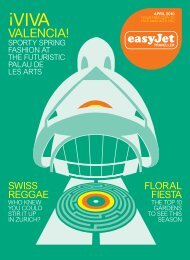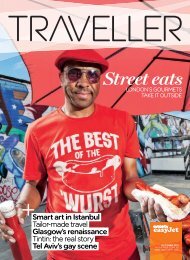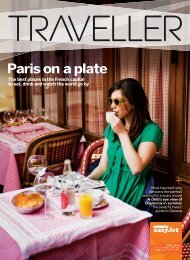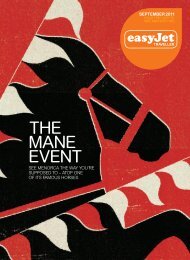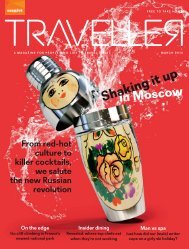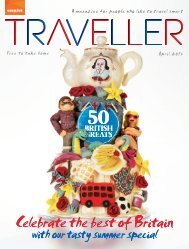november-2010
november-2010
november-2010
Create successful ePaper yourself
Turn your PDF publications into a flip-book with our unique Google optimized e-Paper software.
FASHION | MANCHESTER<br />
Manchester was no longer competing for<br />
prominence with provincial English cities<br />
such as Leeds and Birmingham. This was<br />
now a city that could stand alongside the<br />
likes of Lisbon and Barcelona – perhaps<br />
not in the sense that it was as naturally<br />
beautiful as them, but in that it was a<br />
vibrant and creative place to be. The BBC<br />
certainly thought so; it plans to move into<br />
the regenerated Salford Quays next year.<br />
“Actually, we like to call it the ‘Original<br />
Modern City’,” says Mancunian designer<br />
80 | TRAVELLER | 15 TH BIRTHDAY ISSUE<br />
Peter Saville. And if anyone could<br />
understand and explain Manchester’s<br />
unique character, it’s him. After all, this<br />
is the man who not only designed some<br />
of Factory Records' most iconic album<br />
sleeves, but also became a partner in Tony<br />
Wilson’s business when it was still getting<br />
off the ground. These days he holds a role<br />
that, he believes, is unique to any city in the<br />
world. He has been Manchester’s creative<br />
director since 2005, a post created to better<br />
understand Manchester as a brand.<br />
“I was looking for an insight into the<br />
essence of the place but also a target for the<br />
city to aspire to,” he remembers. “We can all<br />
understand Manchester in its historic guise<br />
as the fi rst industrial city. That’s all very<br />
nice, but it’s museum based. So I wanted<br />
something that would challenge the way<br />
the world saw Manchester today but would<br />
also give something for Manchester to aim<br />
at too. From that came the idea that we can<br />
view Manchester as original and modern in<br />
the 21st century too.”<br />
SAVILLE DOESN’T HOLD much truck with<br />
the idea that having a branch of Harvey<br />
Nichols automatically makes Manchester a<br />
world-class city. As it has done in the past<br />
through its industry, politics and music,<br />
Saville thinks that Manchester defi nes its<br />
place in the world by what it exports, not<br />
what it imports.<br />
“Friendliness, bloody-mindedness,<br />
willfulness – they’re all characteristics<br />
of Manchester,” he says. “Factory and<br />
Hacienda had all of those traits, and<br />
they both mark a particular point in the<br />
evolution of popular culture, where<br />
a bridge was built between music and<br />
other ways of life.”<br />
Of course, there are those who say<br />
such a legacy has strangled creativity in<br />
the city ever since – every new band is<br />
automatically compared to Joy Division or<br />
New Order, every new club infused with<br />
the "anything goes" spirit of the Hacienda.<br />
In a very real sense there’s a heritage<br />
industry around Factory, which is no<br />
different to the relationship between The<br />
Beatles and Liverpool.<br />
Peter Hook opened the latest instalment<br />
of the Factory brand, FAC251 club, to much<br />
fanfare last year. “But the Factory legacy<br />
is much bigger than a soundtrack,” Saville<br />
argues. “I genuinely believe you don’t get<br />
an iPod without Factory Records. If you<br />
look at the graphics of the modern world,<br />
those styles were familiarised through<br />
a mass audience via pop – and Factory<br />
was the fi rst place that cared about how<br />
things looked. The Hacienda continued<br />
that idea into the buildings that young<br />
people went to. It’s not that architecture<br />
and design didn’t exist before, of course




